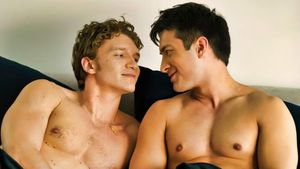At this week's
meeting of the Anglican Consultative Council in
Nottingham, England, the U.S. Episcopal Church reaffirmed
its support for the 2003 ordination of gay bishop V.
Gene Robinson and appealed to the bishops, priests,
and laypeople present to not allow the contentious
issue to split the 77 million-strong Anglican Communion. "We
believe that God has been opening our eyes to acts of
God that we had not known how to see before," the
church said in a document prepared for the council. It
affirmed "the eligibility for ordination of those in
covenanted same-sex unions."
Some Anglican conservatives said that stance
made a schism inevitable. "There's going to be a
divorce," said the Reverend Canon David Anderson,
president of the traditionalist American Anglican Council.
"The question is whether it's going to be a strictly North
American divorce or whether it's going to be Communion-wide."
The issue of homosexuality has opened a rift
between Anglican liberals--many of them in North
America--and conservatives, who are strongest in
Africa and Asia but include many North American
traditionalists. Many fear it is unbridgeable. In February,
leaders of the 38 national Anglican churches chastised
the U.S. Episcopal Church and the Anglican Church of
Canada, asking them not to attend this week's meeting
of the council, an international body of bishops, priests,
and laypeople that meets every three years.
But Anglican leaders also asked the North
American churches to send representatives to explain
the theological reasoning behind the consecration of
V. Gene Robinson as bishop of New Hampshire as well
as the decision by the western Canadian diocese of New
Westminster to authorize the blessing of same-sex
unions. Official church policy declares gay sex
"incompatible with scripture" and opposes gay
ordinations and same-sex blessings.
Delegations from the two churches addressed a
tense and divided meeting, with U.S. liberals and
conservatives sitting on opposite sides of a stifling
university auditorium. Many on the conservative side cooled
themselves with paper fans emblazoned with the words
"Christ's love changed me." Setting out the U.S. case,
Bishop Suffragan Catherine Roskam of New York said the
church believes "a person living in a same-gendered
union may be eligible to lead the flock of Christ."
The U.S. church presented its position in a
130-page document, "To Set Our Hope on Christ." It
argued that "members of the Episcopal Church have
discerned holiness in same-sex relationships and have come
to support the blessing of such unions and the
ordination or consecration of persons in those
unions." In this, the document said, Episcopalians
were in a theological tradition of debate and difference
stretching back to the early Christians.
Presiding bishop Frank Griswold, head of the
Episcopal Church, acknowledged that "our actions
around the question of homosexuality have deeply
distressed a number of you." However, he said, "the
overwhelming majority of Episcopalians are committed to
living a life of unity in difference."
The Canadian team was more conciliatory,
pointing out that the church's governing General Synod
had yet to take a position on same-sex unions and
calling for more discussion. "It is true that we are still
seeking clarity, but it would also be true to say that
we have not changed our minds" about official church
teaching, said the Reverend Stephen Andrews, a member
of the Primate's Theological Commission. "The burden
still rests with those who would revise the church's
teaching to make their case." Unifiers fear
conservatives will set up parallel parishes and
dioceses to bypass the church hierarchy, a move that could
speed a permanent split.
Anglicans' spiritual leader, Archbishop of
Canterbury Rowan Williams, has called for listening
and reflection during the Consultative Council
meeting, which runs through June 28. Any decisions the
council makes must be accepted or rejected by national
Anglican churches. Bishop Charles Jenkins of
Louisiana, the only member of the six-person U.S. team at
the meeting who opposed Robinson's ordination, said he
felt the church had "made a wrong move" in appointing
an openly gay bishop. But he appealed for Anglicans to
stay together. "I do not wish to walk separately from
you, and I pray you will not walk separately from me,"
Jenkins said. (AP)





































































Charlie Kirk DID say stoning gay people was the 'perfect law' — and these other heinous quotes